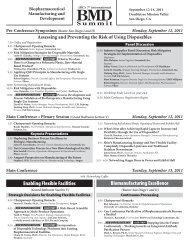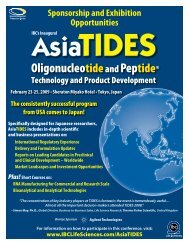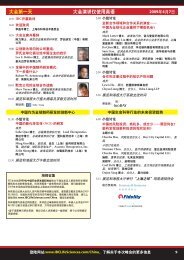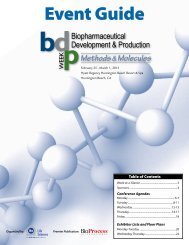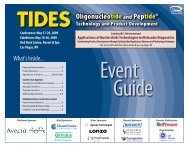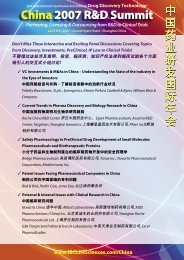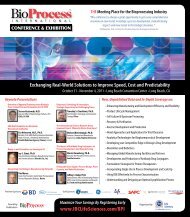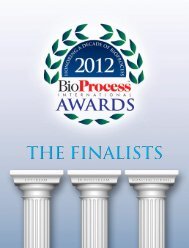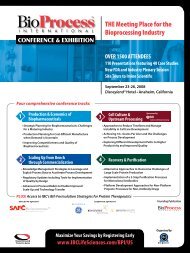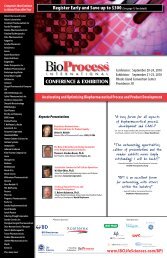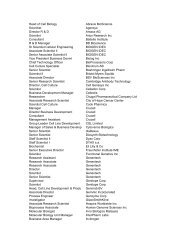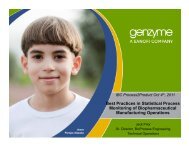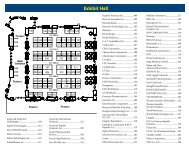Conference ⢠Tuesday, October 2, 2007 - IBC Life Sciences
Conference ⢠Tuesday, October 2, 2007 - IBC Life Sciences
Conference ⢠Tuesday, October 2, 2007 - IBC Life Sciences
You also want an ePaper? Increase the reach of your titles
YUMPU automatically turns print PDFs into web optimized ePapers that Google loves.
Pre-<strong>Conference</strong> Workshops • Sunday, September 30, <strong>2007</strong>Note: The Pre-<strong>Conference</strong> Workshops take place at the Sheraton Boston Hotel (attached to the Hynes Convention Center). All other sessions will take place at theHynes Convention Center. Sheraton Boston Hotel, 39 Dalton St., Boston, MA 02199 • 800-664-6835Workshop A:Analytical Methods Utilized throughout ProcessDevelopment, Product Characterization andFormulation Screening:Matches Made in Heaven or Shotgun Weddings?In many organizations – even large ones - process development, analyticalmethod development, and formulation groups do not have meaningful linkagesamong them to assure that there is adequate alignment of the analyticaltest methods from which all data-driven decisions are made. For example,the process design space is often defined by increased amounts of API withdecreased amounts of process-related impurities (e.g. HCP).Product-related impurities (e.g. degradants) can easily arise duringmanufacturing operations. It is understood that methods used for drugsubstance testing should be verified for their stability-indicating capabilities.But what about methods used for process development? Or methods used forformulation development? Without adequate analytical method capabilities andappropriate alignment of test method procedures, process capabilities cannot beaccurately assessed and formulation optimization could be a wasted effort.This workshop will discuss both regulatory and practical issues necessary forassuring that the combined set of measuring tools used for making key process,product and formulation decisions end up as marriages made in heaven, notshotgun weddings. The workshop facilitators will emphasize highly interactivediscussions among attendees on their experiences and strategies with bothoutcomes.1:30 Co-Chairperson's Opening RemarksNadine M. Ritter, Ph.D., Senior Consultant,Biologics Consulting Group, Inc.Keith H. Wells, Ph.D., Senior Consultant, Biologics Consulting Group, Inc.1:40 Analytical Methods for Biotechnology Products: Heroicor Horrific?Nadine M. Ritter, Ph.D., Senior Consultant,Biologics Consulting Group, Inc.2:10 Regulatory Overview of Process DevelopmentKeith H. Wells, Ph.D., Senior Consultant, Biologics Consulting Group, Inc.2:40 Networking Refreshment Break3:00 Voraxaze: Meeting the Regulatory Challenge CaseStudyRichard Francis, Director of Process Development andTechnical Support, Protherics, United Kingdom3:30 Vaccine for CDAD – Challenges in AnalyticalMethod Development for Process,Formulation, and ProductHersh Mehta, Ph.D., Senior Director, Development, AcambisCaseStudy4:00 Audience Interactive Panel Discussion with all Speakers5:00 End of WorkshopWorkshop B:Transient Expression Systems1:00 Chairperson’s Opening RemarksYves Durocher, Ph.D., Project Leader, Mammalian Cell Technology,Biotechnology Research Institute, National Research Council Canada, Canada1:10 Introduction to Transient Expression SystemsMammalian cells are the host of choice to produce complex recombinantproteins (r-proteins) because of their capability for proper protein folding,posttranslational modifications and assembly. In order to accelerate thediscovery to clinical application phase, significant quantities of r-proteinsmust be available as quickly as possible. Large-scale transfection ofmammalian cells has become a key technology that can reliably delivermilligram to gram quantities of a r-protein in less than one month.Yves Durocher, Ph.D., Project Leader, Mammalian Cell Technology,Biotechnology Research Institute, National Research Council Canada, Canada1:50 Development Towards High Yield in Large ScaleTransient Protein Production in CHOTransient production in CHO has been problematic. Yields similar to HEK293 cells have been hard to achieve since some characteristics that makeCHO an excellent host for stable production hinder transient production. Wewill present data to demonstrate the utility of a new transfection system wedeveloped to overcome some of these hindrances to reach over 0.5g of MAbfrom only 10L of culture.Henry C. Chiou, Ph.D., Technology Area Manager, Molecular BiologyEssentials R&D, Invitrogen Corporation2:30 Protein Production Via Large Scale TransientTransfection of Mammalian CellsCaseStudyAbstract unavailable at press time. Please visit <strong>IBC</strong><strong>Life</strong>Science.com/BPI/USfor updates.Gerald F. Casperson, Ph.D., Associate Fellow, Biotherapeutics, Pfizer, Inc.3:10 Networking Refreshment Break3:40 Addressing IgG Expression Issues and ImprovingProductivity during Transient ExpressionCaseStudyAn efficient transient expression system facilitates rapid expression of IgGs forproof of principle studies during drug development at Cambridge AntibodyTechnology (CAT). This case study will highlight the efficient transientexpression system in use at CAT and strategies in place to address poor IgGexpression issues. Data will be presented from the analysis of some ‘difficult toexpress IgGs’.Lekan Daramola, Ph.D., Head of Antibody Format Technologies, Cell<strong>Sciences</strong>, Cambridge Antibody Technology, United Kingdom4:20 Novel Approaches for the Improvement ofTransient Expression using CHO CellsCaseStudyProtein production by transient gene expression in CHO cells, especially inprotein-free systems, has suffered from low productivities. This presentationdescribes Lonza’s experience with different chemical and physical approachesfor increasing recombinant antibody production in protein-free CHO systems.Concentrations up to 40 mg/L were achieved in shake-flask culturesAlison J. Mastrangelo, Ph.D., Science Leader, Cell Culture ProcessDevelopment,Lonza Biologics, United Kingdom5:00 End of Workshop5 To Register, Call: (800) 390-4078 • Fax: (941) 365-0104 • E-mail: reg@ibcusa.com



